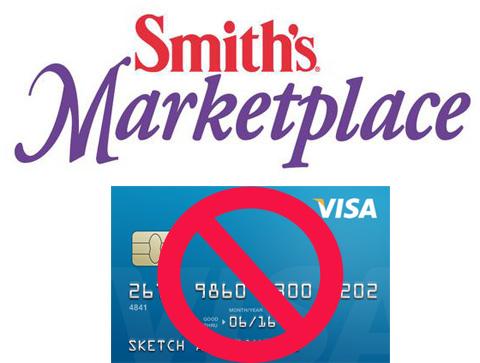 By DAVID TUBBS
By DAVID TUBBSKroger first banned VISA credit cards in 2018 at its Foods Co division in California. In expanding the ban to Smith’s, Kroger publicly claimed numerous offenses by VISA, the most emphasized of which is that VISA charges “excessive interchange and network fees.”
Contradicting Kroger’s public claims is tedious but straightforward. It is much more important, however, for customers to understand that comparing fees among credit-card networks (the issue on which Kroger bases its claims) is not equivalent to assessing the cost to Kroger of those fees, which in the end is all that matters to business operations.
I have developed a mathematical model to calculate average expenses for all types of payment – credit card, debit card, and cash (cash payments are not free) – at Smith’s or any other Kroger supermarket. The model is based on national statistics for credit-card use, payment types, and purchasing patterns at supermarkets. It utilizes current, publicly available interchange and network fees that are applicable to credit and debit cards. Modeling and analysis are based on business fundamentals drawn from Kroger’s annual report to shareholders and from Value Line Publishing. The results of my calculations place quantified doubt on Kroger’s policy to ban VISA credit cards.
Kroger is the nation’s largest supermarket corporation, with more than $122B in recent annual sales. Annual cash flow exceeds $4B, and earnings and net profit each have been more than $1.6B annually. The expense which I estimate for all Smith’s supermarkets to accept VISA credit cards (probably $4-6M more annually than to accept MasterCard) is a trivial fraction of 1 percent of these business fundamentals.
Across all Kroger supermarket divisions, the difference between VISA and MasterCard expenses is nominally 2-3 percent of cash flow and roughly 5-7 percent of earnings and net profit, which would hardly seem to burden Kroger’s business sustainability. VISA credit cards did cost Smith’s (and do cost other Kroger divisions) more than other card brands, not because VISA fees are excessive or higher than those of other card networks, but fundamentally because credit-card customers use VISA much more often than MasterCard, Discover, or American Express.
As Kroger ambitiously, and perhaps incautiously, expands into e-commerce and home delivery in competition with Amazon and Walmart, some of its discretionary expenses reach into the billion-dollar range: in 2017, Kroger spent $707M on advertising, paid $443M in stock dividends, and spent $1,567M to buy-back its own shares of stock. I estimate that banning VISA credit cards at all Smith’s might save from $1M to an improbable maximum of $12M annually, which is a trivial fraction (0.03-0.4 percent) of Kroger’s summed discretionary expenses. The probable saving from banning VISA credit cards across all Kroger supermarket divisions is 0.5percent to at most 9 percent of total discretionary expenses.
Share repurchasing alone allows sufficient latitude to accommodate the expense of VISA credit cards without need to increase the price of merchandise, at Smith’s or any other Kroger supermarket. Stock buy-back is a corporate trick used to benefit shareholders and excite investors by artificially increasing stock price, but it does nothing to benefit customers or business fundamentals. Kroger can simply reduce its extravagant stock-repurchase program by less than 1 percent to cover VISA expenses at Smith’s and by at most 15percent to cover VISA expenses at all supermarket divisions.
As Kroger surely knows, its VISA ban directly affects a minority (on average, 15 percent) of Smith’s customers, most of whom through necessity, marketing persuasion, or inertia will remain loyal. On the other hand, I estimate that if fewer than 2 in every 100 former VISA credit-card customers stop shopping at Smith’s, Kroger’s loss in sales could exceed the largest saving that it can hope to achieve by banning VISA credit cards. In Los Alamos County, a few dozen customers can make such a difference.

